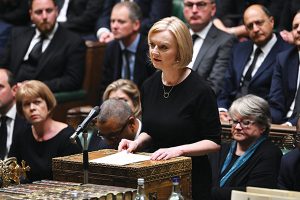Bloomberg
Liz Truss’s government was barely into its stride when the UK was thrust into a state of suspended animation following the death of its longest-serving monarch, Queen Elizabeth II.
But after Monday’s state funeral, British politics will return full-throttle with the new prime minister back under pressure over a deepening economic crisis.
Truss starts the week by flying to the United Nations General Assembly in New York — her first outing on the world stage as UK premier. She will end it in the House of Commons, as her Chancellor of the Exchequer Kwasi Kwarteng lays out a mini-Budget that will set the tone for her premiership.
It has been an unprecedented start for Truss, who was formally appointed by the Queen just two days before she died on Sept. 8. Her death was announced hours after Truss unveiled a sweeping package of support for Britons facing soaring energy bills, but much of the detail — including how firms can expect to benefit — has remained unpublished during the period of national mourning.
It’s left the British public, as well as members of her ruling Conservative Party, with unanswered questions about how she plans to govern.
Channeling Thatcher
Truss, who was foreign secretary under Boris Johnson, won the Tory contest to replace him as leader by appealing to the small-state, Thatcherite base of the party. She promised lower taxes, slammed the “Treasury orthodoxy†she said was holding the country back and hit out at the idea of “handouts†for people struggling.
Yet in her first week in the job, she unveiled a massive intervention to contain energy prices that will cost taxpayers billions.
Allies of Truss say the plan provides cover for her to pursue the type of policies that will placate the ideological right of the party. As a die-hard libertarian, they are policies she believes in the most strongly but are also seen as essential for party management given her power base.
According to people familiar with her thinking, Truss wants to ensure rank-and-file Tories are left in no doubt that her government will be more traditionally Conservative than Johnson’s, which was criticized by many in the party for defaulting to state intervention as problems arose.
Though officially in a news blackout period, snippets of Truss’s plans have appeared in the press, including some of the key promises of her leadership campaign.
A crackdown on trade unions is one, an issue likely to take center stage at the Tory conference in October when train drivers plan to go on strike. On Wednesday, the government is due to announce plans to support businesses with their energy bills and Thursday is set to explain how it plans to tackle the backlog at the National Health Service.
 The Gulf Time Newspaper One of the finest business newspapers in the UAE brought to you by our professional writers and editors.
The Gulf Time Newspaper One of the finest business newspapers in the UAE brought to you by our professional writers and editors.
